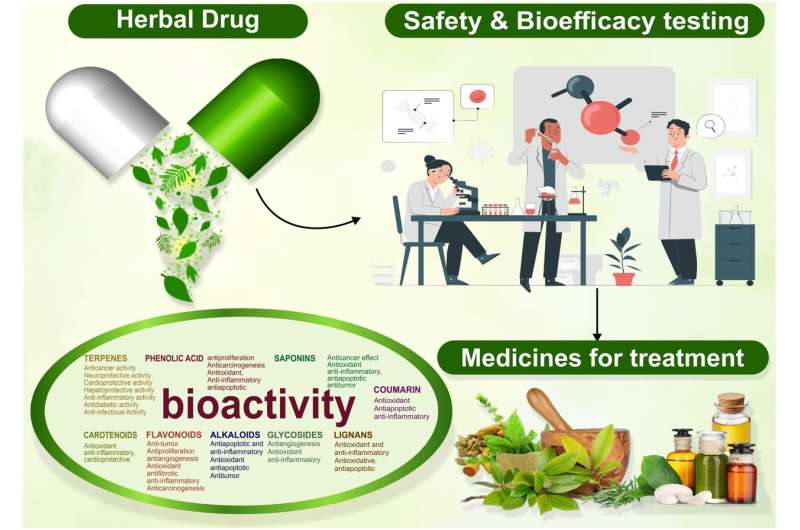This article has been reviewed according to Science X's editorial process and policies. Editors have highlighted the following attributes while ensuring the content's credibility:
fact-checked
proofread
Researchers explore the safety, efficacy and bioactivity of herbal medicines

Herbal medicines have been an integral part of traditional health care systems worldwide, dating back thousands of years. These natural remedies, rooted in cultural traditions, are now experiencing a resurgence in popularity as the demand for holistic and personalized health care grows. This review explores the convergence of traditional wisdom and modern science in the realm of herbal medicines, focusing on their safety, efficacy, and bioactivity in contemporary health care settings.
The historical context of herbal medicines is rich and varied. In ancient civilizations, such as those in China, India, and Egypt, herbal remedies were central to medical practices. Systems like Ayurveda and Traditional Chinese Medicine (TCM) have long utilized a vast array of herbs for treating various ailments. These traditional practices were based on centuries of observation, experimentation, and documentation, creating a deep reservoir of knowledge. Today, this ancient wisdom is being revisited and scientifically validated, bridging the gap between traditional and modern health care.
One of the primary concerns with the use of herbal medicines is their safety. Unlike conventional drugs, herbal remedies often contain multiple active ingredients, which can lead to complex interactions within the body. This review meticulously examines the safety profiles of various herbal remedies. It highlights the importance of rigorous scientific scrutiny to identify potential adverse effects and interactions with conventional medications.
Standardization of herbal preparations is emphasized to ensure safety, efficacy, and consistency. Case studies and clinical trials are reviewed to provide a comprehensive understanding of the safety concerns associated with herbal medicine use.
The therapeutic efficacy of herbal interventions is a critical area of investigation. Historically, the benefits of herbal remedies were supported by anecdotal evidence and traditional practices. However, modern science demands empirical evidence to validate these claims.
This review evaluates the efficacy of herbal interventions through the lens of contemporary research. Clinical trials and studies on herbs like turmeric (curcumin), Ginkgo biloba, and garlic are discussed, showcasing their benefits in improving cognitive function, cardiovascular health, metabolic disorders, and more. By comparing historical anecdotes with empirical data, this review provides a balanced perspective on the therapeutic potential of herbal medicines.
Understanding the bioactivity and mechanisms of action of herbal compounds is crucial for their integration into modern health care. Herbal remedies often contain a myriad of active ingredients that work synergistically to produce therapeutic effects.
This review delves into the complex bioactivity of these compounds, explaining how they interact with human physiology. For example, curcumin's anti-inflammatory properties, Ginkgo biloba's neuroprotective effects, and garlic's antimicrobial properties are explored in detail. The pharmacokinetics and pharmacodynamics of these herbs are analyzed to provide a scientific basis for their use in medical treatments.
The integration of herbal medicine into modern health care presents both opportunities and challenges. This review discusses the potential benefits of incorporating herbal remedies into conventional medical practices. It highlights successful case studies where herbal medicines have been used alongside conventional treatments to enhance patient outcomes.
The review also addresses the regulatory and standardization issues that must be overcome to ensure the safe and effective use of herbal remedies. By fostering a dialogue between traditional practitioners and modern scientists, this review advocates for a holistic approach to health care that combines the strengths of both systems.
In conclusion, the synthesis of traditional wisdom and modern science in the field of herbal medicine holds great promise for advancing health care. By critically examining the safety, efficacy, and bioactivity of herbal remedies, this review illuminates the evolving landscape of herbal medicine.
The goal is to integrate the best of both worlds, enhancing global well-being through effective, safe, and holistic treatment options. As interest in personalized and holistic health care grows, the potential of herbal medicine as a valuable complement to modern health care practices becomes increasingly evident.
The study is published in the journal Future Integrative Medicine.
More information: Acharya Balkrishna et al, Exploring the Safety, Efficacy, and Bioactivity of Herbal Medicines: Bridging Traditional Wisdom and Modern Science in Healthcare, Future Integrative Medicine (2024). DOI: 10.14218/FIM.2023.00086




















